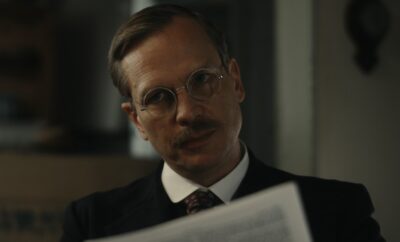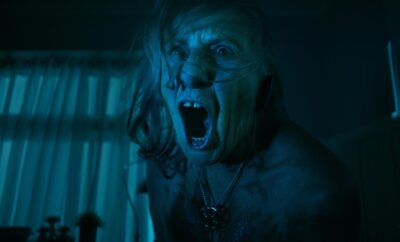
Interviews
Suman Sen – The Silent Echo
By: Ashlee Dell’Arciprete
Q) Congratulations on directing your first short film. How did you come to work on the project?
A) Thanks. I follow cultures and people around length and breadth of the country and a few parts of the world too. I love meeting new people, understanding their life. I am a mountain person and for some reason I have a biased belief that whatever innocence is left in the world it’s there in the mountains. Maybe because mountain makes you to stay humble. For that matter nature makes you to do the same too.
I have never worked as a commissioned director so far in any of the projects. So, honestly, I never chose any project. I developed all the from the idea to screenplay level on my own. When it comes to idea, there is not specific plans as such to approach them. I am indebted to the time I am living in. It is important my works to represent the time I am going through.
Q) Please walk us through the meaning behind your movie The Silent Echo.
A) Honestly, I do not want to make it sound very complicated or intellectually burdened. An echo cannot be silent, can it be? I just wanted to play with that contradiction, the dichotomy.
The Silent Echo is a story about unfulfilled dreams, underlying emotions, unspoken despair. It is about the way we see the world and the way nature sees us. It is about the overburdening and irrelevant distinction we make on ourselves without even realizing how insignificant we are.
Q) You also produced and wrote The Silent Echo. How long of a process was the production?
A) The production of the film was really a humbling experience for me and a little overwhelming, too. For the film I travelled from across the Himalayan range for more than a month. I am fortunate to have collaborators from across the globe from Bangladesh, Paris, Nepal, Sweden and Lebanon who have come together to make this film happen.
The relationship with my producers are like my extended family. Dominique Welinski from France is my long-term collaborator, as she has been part of both of my short films and feature too. Bijon and Arifur Rahman from Bangladesh are more like my brothers with whom I have been working for the longest time. They are also part of my feature film. Vivek, my producing partner in my company in India, and Ram Krishna Pokharel is an Emmy Award Winning producer and based in Nepal. Honestly, without his active participation on the shoot, the film would not have made the film. I owe immense gratitude to all my esteemed collaborators Xoaher [Musavvir] who did shot the film beautifully, Olivier [Jahan] who edited it, Yov did a magical work on the grading and Mayukh Moinak scored it amazingly and gave the soul to the film. I am incomplete without my team.
Q) The locations in the film are beautiful. Did you know where you wanted to film when you initially wrote the film or did that come during location scouting?
A) I just knew that I would be shooting in a particular area, but we didn’t lock any particular place. It came during location scouting only. Finding the location took us weeks. The production wouldn’t have been possible without the constant support my Nepali producer. I am usually very picky about all the elements of the film, especially the location. We started a road trip from Pokhra to Jomsom. We camped in Jomsom for days and started exploring the villages and unexplored locations around. While travelling to Kagbeni we accidentally found a ridge right beneath Dhaulagiri range where people hardly go. It was exactly the way I had written it on the script.
Q) The diverse cast and crew are exceptional. How important was representation to the film and how involved were you with casting?
A) The kids I worked with in this film are not actors or never faced cameras before. They are indigenous kids from the Mustang district of western Nepal, bordering Tibet. They are from a forbidden land named “Lo Manthang.” culturally and linguistically influenced by Tibet. I do not speak the language of the film, but that never stopped me from communicating with them. They usually come to study in Pokhra in wintertime at the refugee camps. We camped in Pokhra to do the casting and met at least a hundred kids across schools in different parts. Finally, through an intensive auditioning process we selected four kids from three different schools.
Honestly, I always want to prioritize the demand of the script. I do not want to keep representation at the core while writing, casting or for that matter anything creative.
Q) How long did the short take you to make from start to finish?
A) I developed the original idea to a screenplay and shared it with my producers around late 2019. We started hatching it out since then. The idea was not to do something pretentious and preachy. It took a month a craft the final script. We did start our pre-production around 2020 January and fortunately we could finish the principal photography right before the pandemic started around February 2020.
Q) What was your favourite or most challenging scene to shoot?
A) Undoubtedly the climax when we hear Kunsang sing the sob for the first time. It was creatively and logistically challenging both at the same time.
I shot the film in the most extreme part of North-Western Nepal, close to the Tibetan border, in a language unknown to me. I was in the lap of the beautiful yet unforgiving Himalayan ranges where the terrain and weather are equally challenging. It was average -10 degrees temperature with a constant nagging ghastly wind on top of the mountain
Q) What do you hope viewers take away from exploring The Silent Echo?
A) Honestly, I don’t want to determine the “take aways” beforehand. You cannot enforce a mandate on a film. It overburdens the joy of witnessing an experience. I will let the audience decide that, if at all there is any.
Q) What advice would you give to aspiring filmmakers looking to make it in the industry?
A) The only advice I can give is “don’t listen to any advice, always remember you are not doing yourself a favour or not to anyone else either. Convince yourself first and then go for it. Do not try to convince others ever while making your film.”
Q) Another congrats on all of the success of the film. What is next for you?
A) Thanks a lot. I am still cherishing the residual success of the The Silent Echo as it continues travelling to festivals across the world. I am about to finish the post-production of my second short film Cry Me A River set in Taiwan for which I received the grant and support of the Information Bureau of Taichung City Government. My debut feature film, Eka (Solo), was part of NFDC Film Bazaar Co-Production Market 2019 and Torino Film Lab Next 2020 and La Fabrique cinéma de l’Institut francais 2021, Festival du nouveau cinéma – Montréal 2022 is going on floor in early 2023 is an India-France-Bangladesh-Canada -Norway co-production has received Aide aux cinémas du monde by the CNC. I am entirely invested into the pre-production of the feature film at this moment.





You must be logged in to post a comment Login